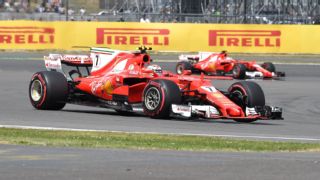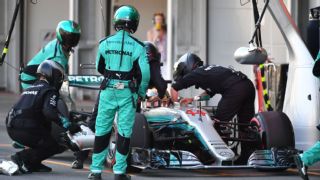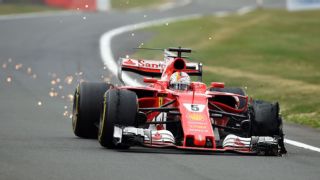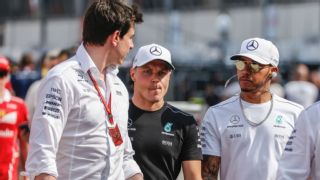|
Ahead of his post-British Grand Prix media session, Mercedes boss Toto Wolff walked into the team's hospitality unit, shook some hands, flashed a grin and said: "Best race ever!" A race that had looked good turned into the team's best of the year so far, a resounding one-two with Ferrari's lead driver limping home in seventh. While much of this season has seen Mercedes yinging and yanging with performance, Ferrari has remained consistent and often capitalised whenever the world champions have dropped points. Ahead of the weekend Wolff had called on the world champions to "put things right" for the team -- in particular Lewis Hamilton -- after reliability issues had squandered a win in Baku and at least a podium in Austria. It's not difficult, then, to understand why Wolff was in such high spirits on Sunday. When Ferrari won the Monaco Grand Prix on May 28, seven weeks earlier, it seemed like a significant moment in the 2017 championship. A dominant one-two saw the Italian team take a 17-point lead in the constructors' race and prompt Wolff to urge Mercedes to embrace the team's "new reality" of being true underdogs for the first time in the V6 turbo era. Not for the first time this season, the world champions had struggled with Pirelli's softest compounds, with Hamilton especially struggling to get his tyres into the right working range for the weekend. Hamilton also encountered similar issues in Sochi, while Valtteri Bottas's struggles with his rear tyres hampered his performance at the Bahrain Grand Prix.  But in the four races since then, Ferrari has failed to record a win and has only registered two trips to the podium. By contrast, Mercedes has won three of the four races and been on pole at each. Ten days of 24/7 factory work helped Mercedes better understand and overcome its Monte Calro troubles in time for Canada, where Hamilton took pole, 0.330s ahead of Vettel. Throughout that weekend, Mercedes' clear advantage through the final sector suggested it was still marginally ahead in the power stakes. Vettel's early collision with Max Verstappen robbed us of seeing Mercedes and Ferrari fight it out for a win, but both Mercedes looked strong enough to finish both cars on the podium regardless. Then came Baku, a circuit which rewards outright engine power. Hamilton claimed a resounding pole position, with the nearest Ferrari of Kimi Raikkonen 1.1s behind. Six of the top ten qualifiers were in Mercedes-powered cars. Ignoring the infamous Lewis Hamilton-Sebastian Vettel incident, that was a race Mercedes should have won. Even without Vettel's stop-go penalty taking him out of contention, Hamilton seemed to have the measure of the Ferrari driver, while Valtteri Bottas' clumsy collision with Kimi Raikkonen had forced him into a recovery drive from the back of the field. The headrest issue on Hamilton's car, which forced him into an unscheduled stop, cost Mercedes a win. The fact Bottas got back to second suggested pace in the car was good enough for at least third place in normal circumstances -- for Mercedes, it was the ultimate own-goal. Vettel somehow left Baku with a bigger points' gap over Hamilton on a circuit Mercedes should have excelled on.  Austria followed, and this would prove to be the closest Ferrari came to a win in this post-Monaco spell. After showing good pace in Friday practice, Hamilton's chances took a big hit with a gearbox penalty -- giving Ferrari the chance to put lone gunner Bottas under big pressure in the race. Bottas snatched pole by less than 0.1s from Vettel as Ferrari came surprisingly close in Q3; the Finn would, in the words of Niki Lauda, "save" Mercedes by holding off Vettel's late charge to win the race. Though Hamilton had to settle for fourth, his pace in the closing stages suggested he could have easily closed out the podium had he started third on the grid (where he qualified). Silverstone looked like it would be another case of squandered opportunity for Mercedes. Bottas topped both Friday practice sessions before his gearbox change was confirmed, meaning once again Mercedes' hopes for pole position rested on one car. A supreme effort from Hamilton saw him take it by 0.5s and in the race he disappeared up the road. Raikkonen held second but, even in clear air, struggled to match the lap times of the race leader. Also of note was Vettel's weekend. Out-qualified by Raikkonen, then sucked into a battle with Max Verstappen for third, it was arguably the German's first sub-par performance of the season. Up to that point this championship battle has been characterised by Vettel's consistency and Hamilton's dramatic pendulum swings. Silverstone seemed to confirm what many pundits believe about this year -- that when Hamilton is having a good day in that car, he's unbeatable. But as we saw at Sochi and Monaco, he can find it particularly difficult to master the Mercedes W08's diva-ish behaviour. If Hamilton and Mercedes have truly solved the problems which plagued the first part of the season, Vettel cannot afford another weekend like that.  The other protagonist in the title fight, Bottas, seemed to have limited the damage by fighting back to third, leaving a Mercedes-Ferrari-Mercedes-Ferrari running order on a circuit which is 70 per cent full throttle, placing a big emphasis on power. Ferrari's tyre drama in the closing laps helped Mercedes claim the one-two it probably felt was on the cards without Bottas' penalty. No wonder Wolff looked so happy. But despite the result and the pace his team showed in recent races, he also struck a cautious tone after the race. When asked in that same Silverstone press session if he felt the last few races were evidence Mercedes has pulled away, Wolff replied: "I would like to feel it, but the moment you say that, you go to the next race and feel as though you've been slapped in the face. "It is tricky and our car is not always easy to set up, and we have become much better at doing so. It has been a great team effort in combination with the tyres. But I would like to see Budapest, how the car works, with a low speed and high temperatures track and then maybe I will have a more complete picture." The Hungaroring is the most Monaco-like circuit F1 will have visited since Vettel's win. Power is less important, which will shift focus and intrigue back towards the aerodynamic packages of both teams. If Mercedes is on top there, it will be hard to argue that the world champions do not have a car that can win anywhere going into the summer break.  Silverstone winner Hamilton followed his boss' example by downplaying the suggestion Mercedes has pulled clear. "There's pros and cons between both teams in terms of performance," he said. "Some weekends they're just a little bit ahead of us and other weekends not, so I think it's track dependent. Still, at the moment, they've had the strongest line-up. That's why he is still one point ahead of us. But collectively as a team we are leading the constructors' championship so I guess we've gained points. "It's been kind of level, but this weekend we've been able to exploit the full performance of our car, particularly on both cars, more so than any other race we've done so far this year. It is a great showing and puts us in a good position and gives us a strong platform to start from for the second half of the season." Ferrari should expect to be much closer in Budapest. If Mercedes has another weekend as the stronger team there, someone will need to sound the alarm bells at Maranello.
|
